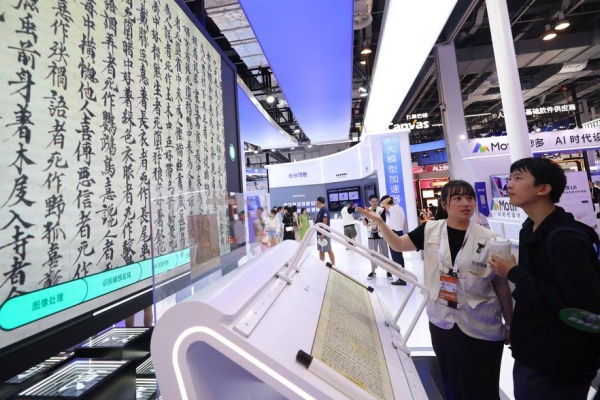
- Home
- Media Center
-
Events
- Wuzhen Summit
- Regional Forums
- Practice Cases of Jointly Building a Community with a Shared Future in Cyberspace
- World Internet Conference Awards for Pioneering Science and Technology
- The Light of Internet Expo
- Straight to Wuzhen Competition
- Global Youth Leadership Program
- WIC Distinguished Contribution Award
- Membership
- Research & Cooperation
- Digital Academy
-
Reports
- Collection of cases on Jointly Building a Community with a Shared Future in Cyberspace
- Collection of Shortlisted Achievements of World Internet Conference Awards for Pioneering Science and Technology
- Reports on Artificial Intelligence
- Reports on Cross—Border E—Commerce
- Reports on Data
- Outcomes of Think Tank Cooperation Program
- Series on Sovereignty in Cyberspace Theory and Practice
- Other Achievements
- About WIC
- 中文 | EN

China proposes new regulation on labeling AI-generated content

A staff member introduces the use of AIGC technology in ancient book restoration to a visitor during the 2024 World AI Conference in Shanghai, East China, July 6, 2024. [Photo/Xinhua]
BEIJING -- The Cyberspace Administration of China (CAC) has released a draft regulation that aims to standardize the labeling of AI-generated synthetic content to protect national security and public interests.
Titled "Measures for identifying AI-generated synthetic content," the draft regulation is open for public feedback until Oct 14, 2024.
AI-generated synthetic content, as defined by the proposed rules, is any text, image, audio or video created using artificial intelligence technologies.
Under the draft regulation, internet information service providers must adhere to mandatory national standards when labeling such content. Providers offering functions like downloading, copying or exporting AI-generated materials must ensure that explicit labels are embedded in the files.
Platforms that distribute content are also required to regulate the spread of AI-generated materials by offering identification functions and reminding users to disclose whether their posts contain AI-generated content.

The World Internet Conference (WIC) was established as an international organization on July 12, 2022, headquartered in Beijing, China. It was jointly initiated by Global System for Mobile Communication Association (GSMA), National Computer Network Emergency Response Technical Team/Coordination Center of China (CNCERT), China Internet Network Information Center (CNNIC), Alibaba Group, Tencent, and Zhijiang Lab.





